Comprehensive Analysis: Reasons for the American Service Economy Shift
VerifiedAdded on 2020/03/16
|6
|1354
|374
Essay
AI Summary
This essay examines the significant shift from an agrarian to a service-based economy in America. It delves into the key reasons behind this transformation, including the rising population, which made the agro-based economy less relevant. The essay explores how the growth of urban markets, technological advancements, social changes, and political factors contributed to this shift. It highlights the impact of the industrial revolution, the rise of capitalism, and the changing values of the American people. The analysis covers the evolution of farming practices, the development of infrastructure, and the impact of social and political ideologies on the economic landscape. The essay also discusses the role of competition, technological innovation, and societal conflicts in shaping the American economy, offering a comprehensive understanding of the transition to a service-oriented society.
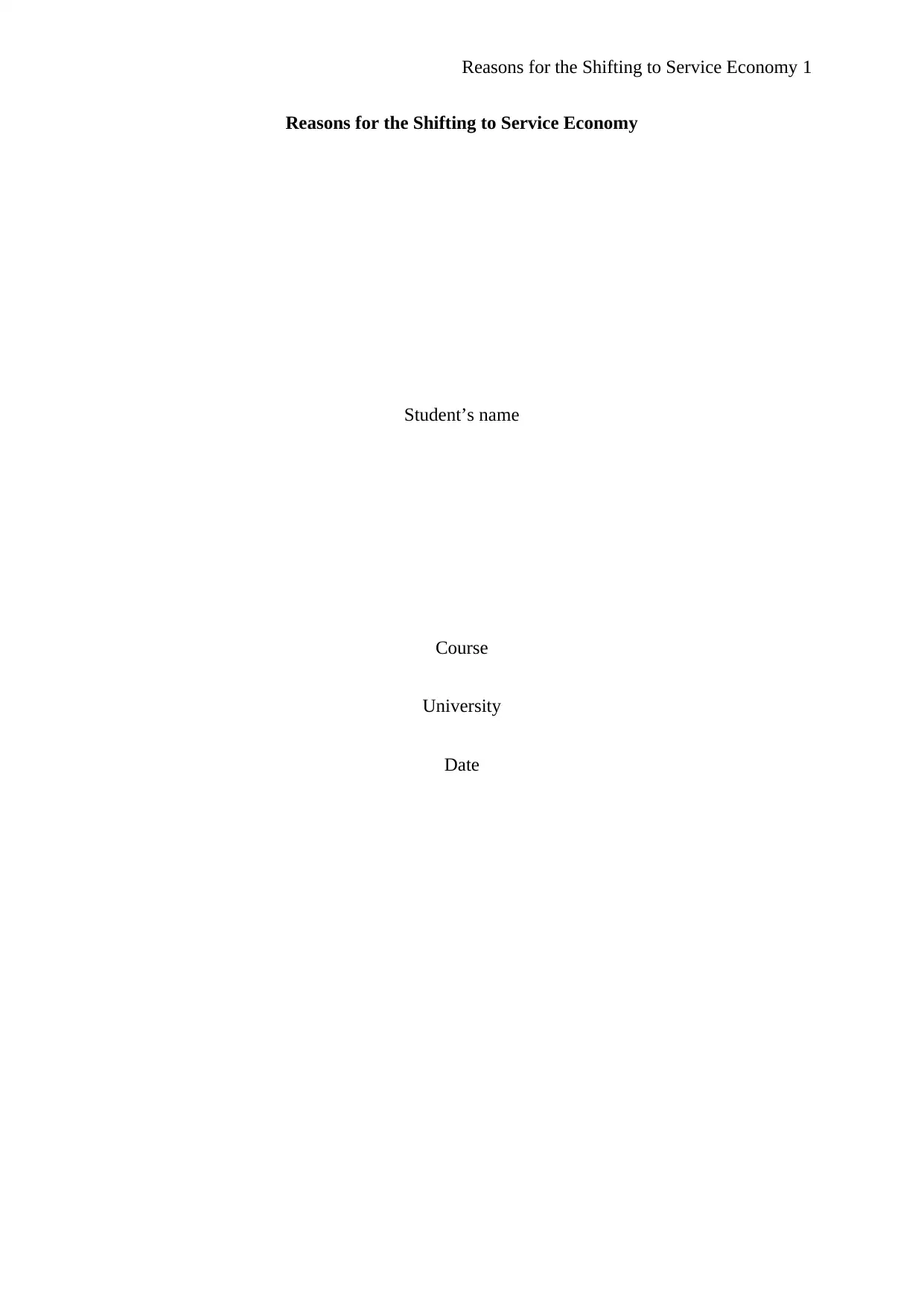
Reasons for the Shifting to Service Economy 1
Reasons for the Shifting to Service Economy
Student’s name
Course
University
Date
Reasons for the Shifting to Service Economy
Student’s name
Course
University
Date
Paraphrase This Document
Need a fresh take? Get an instant paraphrase of this document with our AI Paraphraser
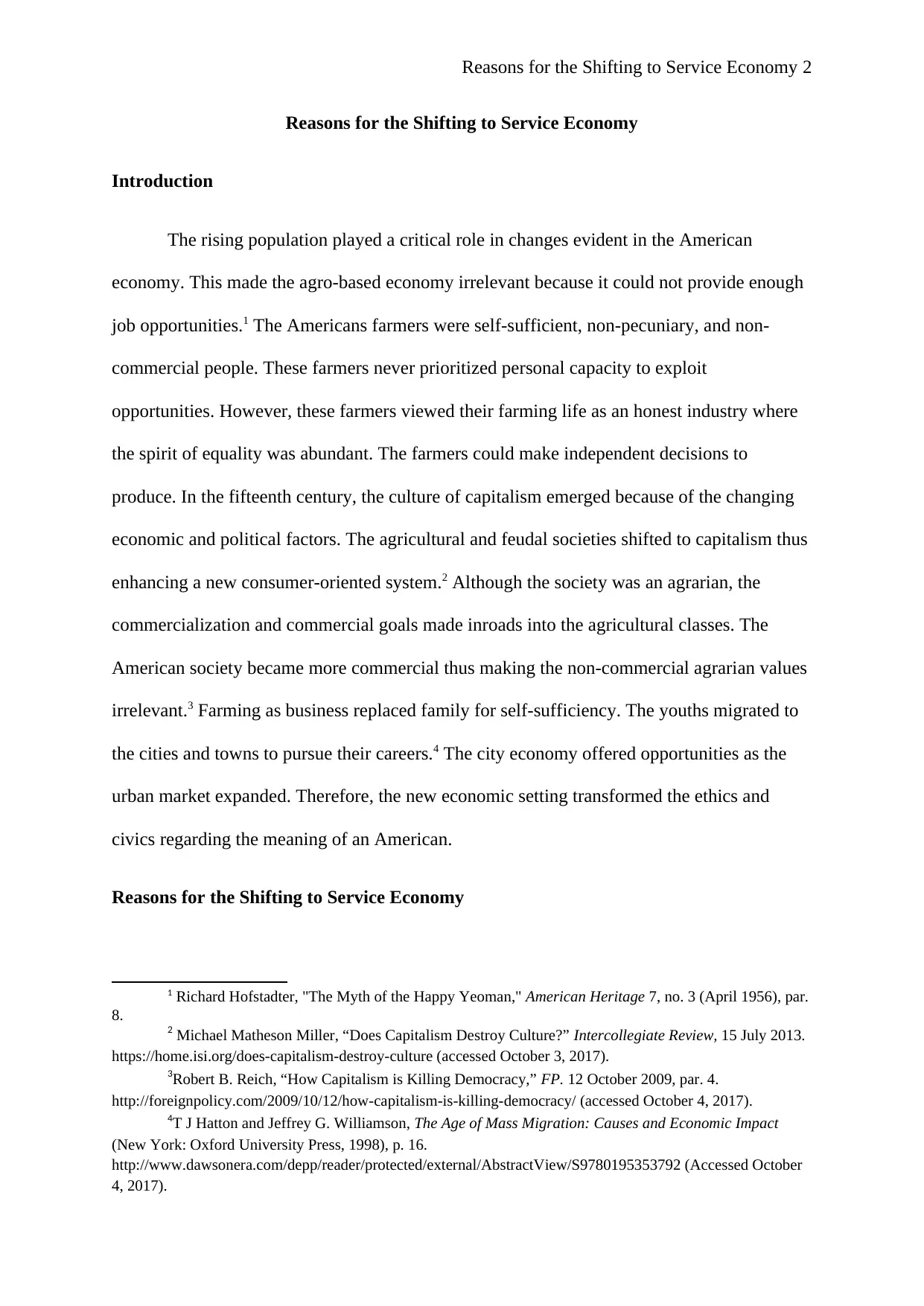
Reasons for the Shifting to Service Economy 2
Reasons for the Shifting to Service Economy
Introduction
The rising population played a critical role in changes evident in the American
economy. This made the agro-based economy irrelevant because it could not provide enough
job opportunities.1 The Americans farmers were self-sufficient, non-pecuniary, and non-
commercial people. These farmers never prioritized personal capacity to exploit
opportunities. However, these farmers viewed their farming life as an honest industry where
the spirit of equality was abundant. The farmers could make independent decisions to
produce. In the fifteenth century, the culture of capitalism emerged because of the changing
economic and political factors. The agricultural and feudal societies shifted to capitalism thus
enhancing a new consumer-oriented system.2 Although the society was an agrarian, the
commercialization and commercial goals made inroads into the agricultural classes. The
American society became more commercial thus making the non-commercial agrarian values
irrelevant.3 Farming as business replaced family for self-sufficiency. The youths migrated to
the cities and towns to pursue their careers.4 The city economy offered opportunities as the
urban market expanded. Therefore, the new economic setting transformed the ethics and
civics regarding the meaning of an American.
Reasons for the Shifting to Service Economy
1 Richard Hofstadter, "The Myth of the Happy Yeoman," American Heritage 7, no. 3 (April 1956), par.
8. 2 Michael Matheson Miller, “Does Capitalism Destroy Culture?” Intercollegiate Review, 15 July 2013.
https://home.isi.org/does-capitalism-destroy-culture (accessed October 3, 2017).
3Robert B. Reich, “How Capitalism is Killing Democracy,” FP. 12 October 2009, par. 4.
http://foreignpolicy.com/2009/10/12/how-capitalism-is-killing-democracy/ (accessed October 4, 2017).
4T J Hatton and Jeffrey G. Williamson, The Age of Mass Migration: Causes and Economic Impact
(New York: Oxford University Press, 1998), p. 16.
http://www.dawsonera.com/depp/reader/protected/external/AbstractView/S9780195353792 (Accessed October
4, 2017).
Reasons for the Shifting to Service Economy
Introduction
The rising population played a critical role in changes evident in the American
economy. This made the agro-based economy irrelevant because it could not provide enough
job opportunities.1 The Americans farmers were self-sufficient, non-pecuniary, and non-
commercial people. These farmers never prioritized personal capacity to exploit
opportunities. However, these farmers viewed their farming life as an honest industry where
the spirit of equality was abundant. The farmers could make independent decisions to
produce. In the fifteenth century, the culture of capitalism emerged because of the changing
economic and political factors. The agricultural and feudal societies shifted to capitalism thus
enhancing a new consumer-oriented system.2 Although the society was an agrarian, the
commercialization and commercial goals made inroads into the agricultural classes. The
American society became more commercial thus making the non-commercial agrarian values
irrelevant.3 Farming as business replaced family for self-sufficiency. The youths migrated to
the cities and towns to pursue their careers.4 The city economy offered opportunities as the
urban market expanded. Therefore, the new economic setting transformed the ethics and
civics regarding the meaning of an American.
Reasons for the Shifting to Service Economy
1 Richard Hofstadter, "The Myth of the Happy Yeoman," American Heritage 7, no. 3 (April 1956), par.
8. 2 Michael Matheson Miller, “Does Capitalism Destroy Culture?” Intercollegiate Review, 15 July 2013.
https://home.isi.org/does-capitalism-destroy-culture (accessed October 3, 2017).
3Robert B. Reich, “How Capitalism is Killing Democracy,” FP. 12 October 2009, par. 4.
http://foreignpolicy.com/2009/10/12/how-capitalism-is-killing-democracy/ (accessed October 4, 2017).
4T J Hatton and Jeffrey G. Williamson, The Age of Mass Migration: Causes and Economic Impact
(New York: Oxford University Press, 1998), p. 16.
http://www.dawsonera.com/depp/reader/protected/external/AbstractView/S9780195353792 (Accessed October
4, 2017).
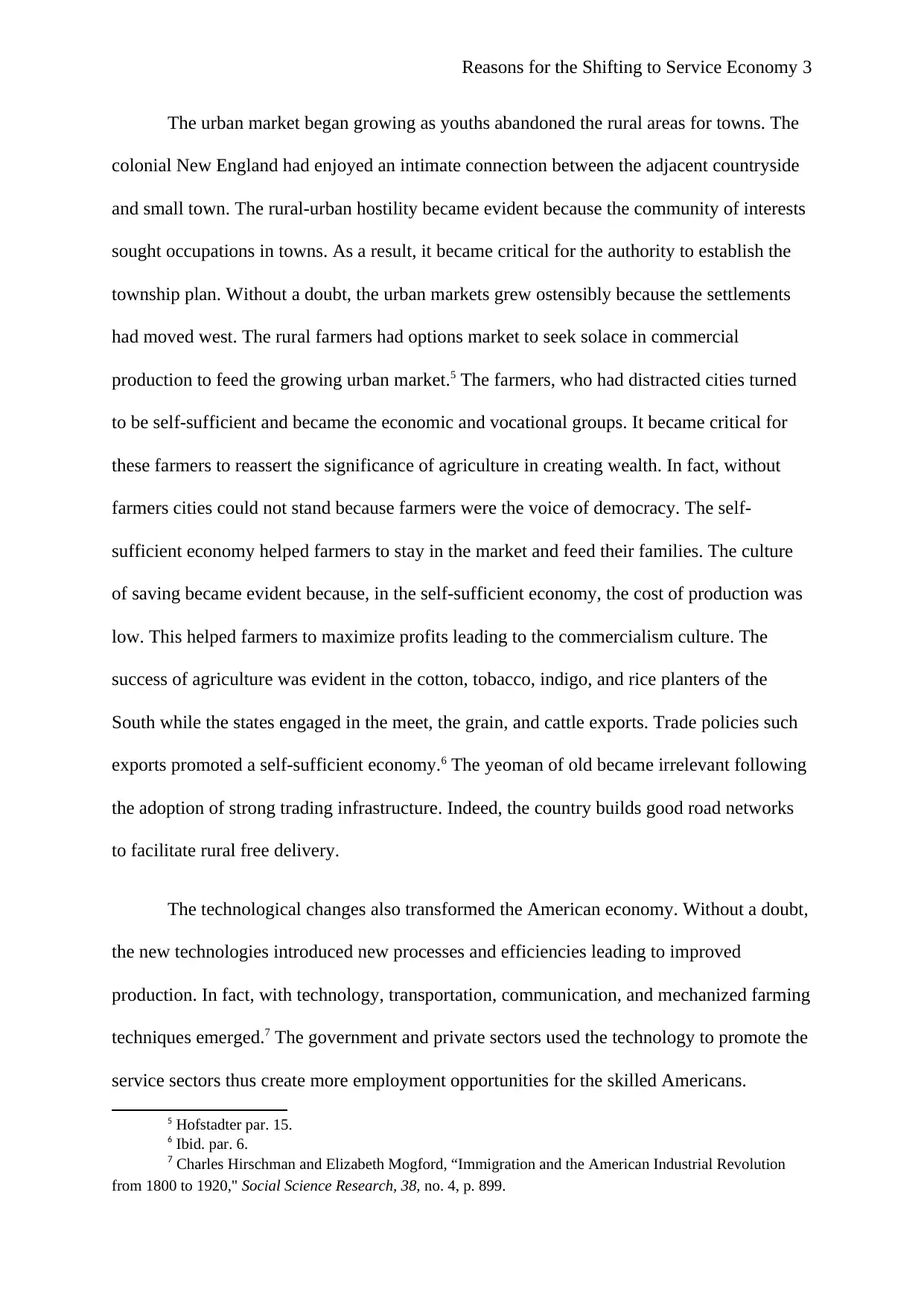
Reasons for the Shifting to Service Economy 3
The urban market began growing as youths abandoned the rural areas for towns. The
colonial New England had enjoyed an intimate connection between the adjacent countryside
and small town. The rural-urban hostility became evident because the community of interests
sought occupations in towns. As a result, it became critical for the authority to establish the
township plan. Without a doubt, the urban markets grew ostensibly because the settlements
had moved west. The rural farmers had options market to seek solace in commercial
production to feed the growing urban market.5 The farmers, who had distracted cities turned
to be self-sufficient and became the economic and vocational groups. It became critical for
these farmers to reassert the significance of agriculture in creating wealth. In fact, without
farmers cities could not stand because farmers were the voice of democracy. The self-
sufficient economy helped farmers to stay in the market and feed their families. The culture
of saving became evident because, in the self-sufficient economy, the cost of production was
low. This helped farmers to maximize profits leading to the commercialism culture. The
success of agriculture was evident in the cotton, tobacco, indigo, and rice planters of the
South while the states engaged in the meet, the grain, and cattle exports. Trade policies such
exports promoted a self-sufficient economy.6 The yeoman of old became irrelevant following
the adoption of strong trading infrastructure. Indeed, the country builds good road networks
to facilitate rural free delivery.
The technological changes also transformed the American economy. Without a doubt,
the new technologies introduced new processes and efficiencies leading to improved
production. In fact, with technology, transportation, communication, and mechanized farming
techniques emerged.7 The government and private sectors used the technology to promote the
service sectors thus create more employment opportunities for the skilled Americans.
5 Hofstadter par. 15.
6 Ibid. par. 6.
7 Charles Hirschman and Elizabeth Mogford, “Immigration and the American Industrial Revolution
from 1800 to 1920," Social Science Research, 38, no. 4, p. 899.
The urban market began growing as youths abandoned the rural areas for towns. The
colonial New England had enjoyed an intimate connection between the adjacent countryside
and small town. The rural-urban hostility became evident because the community of interests
sought occupations in towns. As a result, it became critical for the authority to establish the
township plan. Without a doubt, the urban markets grew ostensibly because the settlements
had moved west. The rural farmers had options market to seek solace in commercial
production to feed the growing urban market.5 The farmers, who had distracted cities turned
to be self-sufficient and became the economic and vocational groups. It became critical for
these farmers to reassert the significance of agriculture in creating wealth. In fact, without
farmers cities could not stand because farmers were the voice of democracy. The self-
sufficient economy helped farmers to stay in the market and feed their families. The culture
of saving became evident because, in the self-sufficient economy, the cost of production was
low. This helped farmers to maximize profits leading to the commercialism culture. The
success of agriculture was evident in the cotton, tobacco, indigo, and rice planters of the
South while the states engaged in the meet, the grain, and cattle exports. Trade policies such
exports promoted a self-sufficient economy.6 The yeoman of old became irrelevant following
the adoption of strong trading infrastructure. Indeed, the country builds good road networks
to facilitate rural free delivery.
The technological changes also transformed the American economy. Without a doubt,
the new technologies introduced new processes and efficiencies leading to improved
production. In fact, with technology, transportation, communication, and mechanized farming
techniques emerged.7 The government and private sectors used the technology to promote the
service sectors thus create more employment opportunities for the skilled Americans.
5 Hofstadter par. 15.
6 Ibid. par. 6.
7 Charles Hirschman and Elizabeth Mogford, “Immigration and the American Industrial Revolution
from 1800 to 1920," Social Science Research, 38, no. 4, p. 899.
⊘ This is a preview!⊘
Do you want full access?
Subscribe today to unlock all pages.

Trusted by 1+ million students worldwide
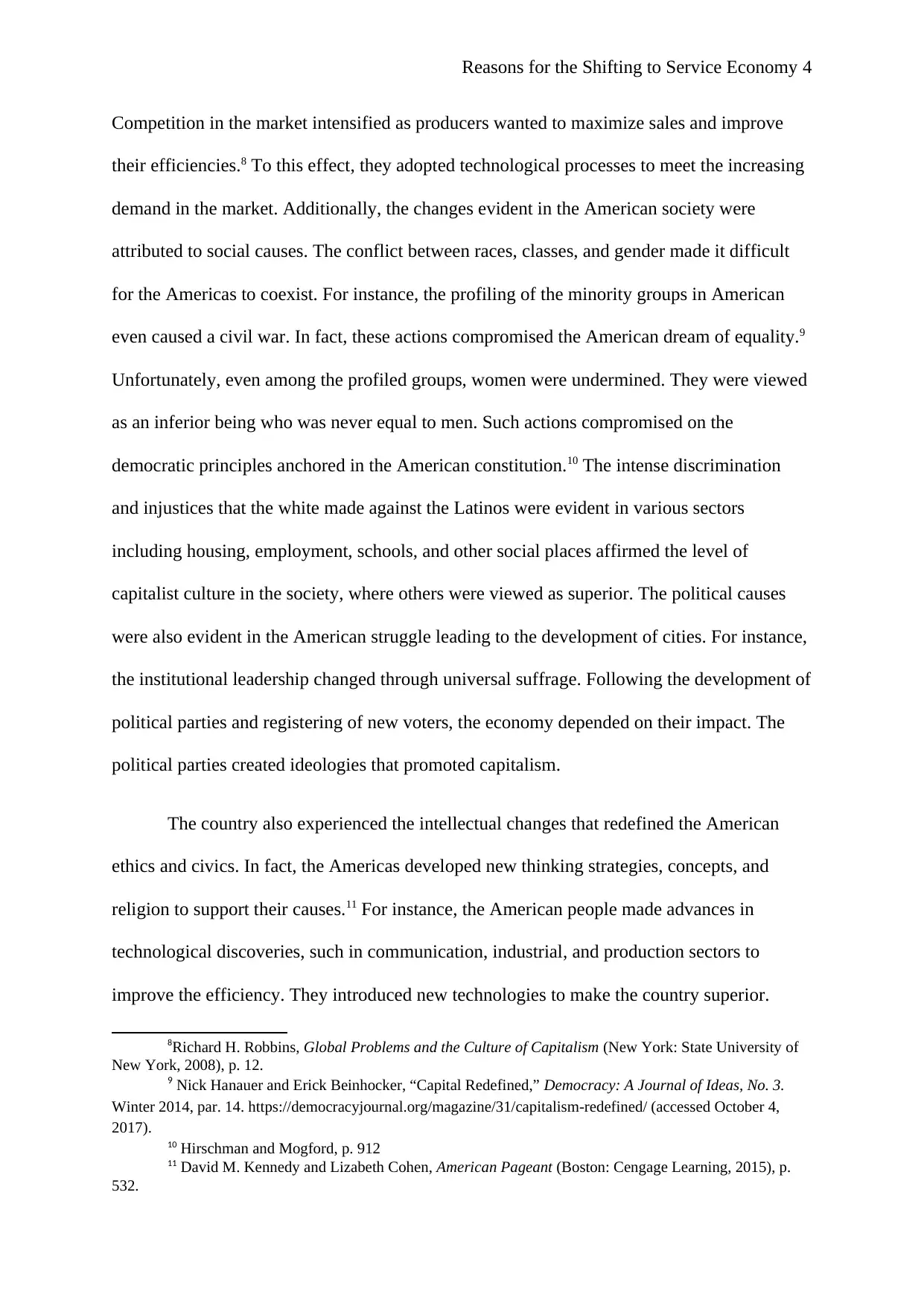
Reasons for the Shifting to Service Economy 4
Competition in the market intensified as producers wanted to maximize sales and improve
their efficiencies.8 To this effect, they adopted technological processes to meet the increasing
demand in the market. Additionally, the changes evident in the American society were
attributed to social causes. The conflict between races, classes, and gender made it difficult
for the Americas to coexist. For instance, the profiling of the minority groups in American
even caused a civil war. In fact, these actions compromised the American dream of equality.9
Unfortunately, even among the profiled groups, women were undermined. They were viewed
as an inferior being who was never equal to men. Such actions compromised on the
democratic principles anchored in the American constitution.10 The intense discrimination
and injustices that the white made against the Latinos were evident in various sectors
including housing, employment, schools, and other social places affirmed the level of
capitalist culture in the society, where others were viewed as superior. The political causes
were also evident in the American struggle leading to the development of cities. For instance,
the institutional leadership changed through universal suffrage. Following the development of
political parties and registering of new voters, the economy depended on their impact. The
political parties created ideologies that promoted capitalism.
The country also experienced the intellectual changes that redefined the American
ethics and civics. In fact, the Americas developed new thinking strategies, concepts, and
religion to support their causes.11 For instance, the American people made advances in
technological discoveries, such in communication, industrial, and production sectors to
improve the efficiency. They introduced new technologies to make the country superior.
8Richard H. Robbins, Global Problems and the Culture of Capitalism (New York: State University of
New York, 2008), p. 12.
9 Nick Hanauer and Erick Beinhocker, “Capital Redefined,” Democracy: A Journal of Ideas, No. 3.
Winter 2014, par. 14. https://democracyjournal.org/magazine/31/capitalism-redefined/ (accessed October 4,
2017). 10 Hirschman and Mogford, p. 912
11 David M. Kennedy and Lizabeth Cohen, American Pageant (Boston: Cengage Learning, 2015), p.
532.
Competition in the market intensified as producers wanted to maximize sales and improve
their efficiencies.8 To this effect, they adopted technological processes to meet the increasing
demand in the market. Additionally, the changes evident in the American society were
attributed to social causes. The conflict between races, classes, and gender made it difficult
for the Americas to coexist. For instance, the profiling of the minority groups in American
even caused a civil war. In fact, these actions compromised the American dream of equality.9
Unfortunately, even among the profiled groups, women were undermined. They were viewed
as an inferior being who was never equal to men. Such actions compromised on the
democratic principles anchored in the American constitution.10 The intense discrimination
and injustices that the white made against the Latinos were evident in various sectors
including housing, employment, schools, and other social places affirmed the level of
capitalist culture in the society, where others were viewed as superior. The political causes
were also evident in the American struggle leading to the development of cities. For instance,
the institutional leadership changed through universal suffrage. Following the development of
political parties and registering of new voters, the economy depended on their impact. The
political parties created ideologies that promoted capitalism.
The country also experienced the intellectual changes that redefined the American
ethics and civics. In fact, the Americas developed new thinking strategies, concepts, and
religion to support their causes.11 For instance, the American people made advances in
technological discoveries, such in communication, industrial, and production sectors to
improve the efficiency. They introduced new technologies to make the country superior.
8Richard H. Robbins, Global Problems and the Culture of Capitalism (New York: State University of
New York, 2008), p. 12.
9 Nick Hanauer and Erick Beinhocker, “Capital Redefined,” Democracy: A Journal of Ideas, No. 3.
Winter 2014, par. 14. https://democracyjournal.org/magazine/31/capitalism-redefined/ (accessed October 4,
2017). 10 Hirschman and Mogford, p. 912
11 David M. Kennedy and Lizabeth Cohen, American Pageant (Boston: Cengage Learning, 2015), p.
532.
Paraphrase This Document
Need a fresh take? Get an instant paraphrase of this document with our AI Paraphraser
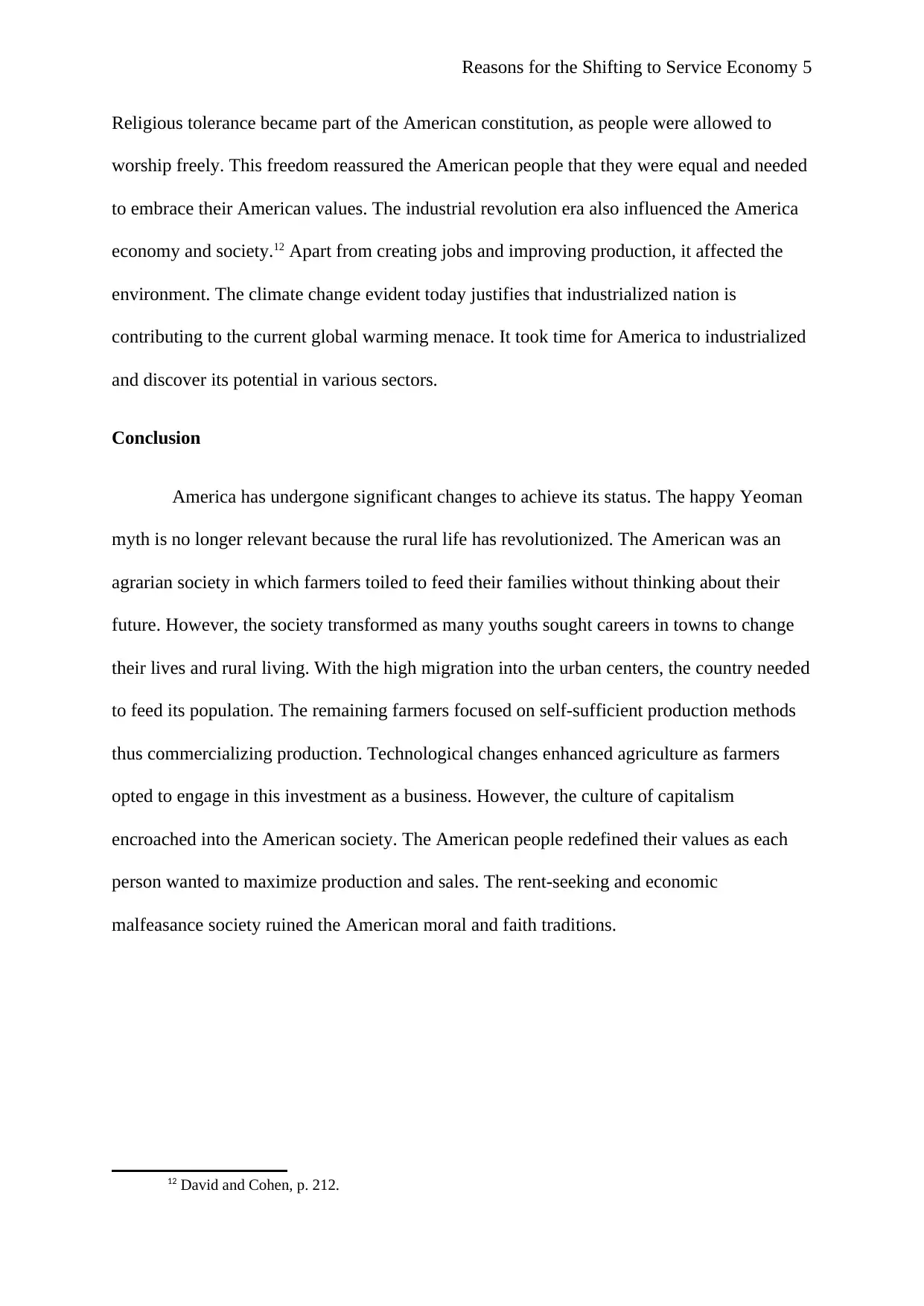
Reasons for the Shifting to Service Economy 5
Religious tolerance became part of the American constitution, as people were allowed to
worship freely. This freedom reassured the American people that they were equal and needed
to embrace their American values. The industrial revolution era also influenced the America
economy and society.12 Apart from creating jobs and improving production, it affected the
environment. The climate change evident today justifies that industrialized nation is
contributing to the current global warming menace. It took time for America to industrialized
and discover its potential in various sectors.
Conclusion
America has undergone significant changes to achieve its status. The happy Yeoman
myth is no longer relevant because the rural life has revolutionized. The American was an
agrarian society in which farmers toiled to feed their families without thinking about their
future. However, the society transformed as many youths sought careers in towns to change
their lives and rural living. With the high migration into the urban centers, the country needed
to feed its population. The remaining farmers focused on self-sufficient production methods
thus commercializing production. Technological changes enhanced agriculture as farmers
opted to engage in this investment as a business. However, the culture of capitalism
encroached into the American society. The American people redefined their values as each
person wanted to maximize production and sales. The rent-seeking and economic
malfeasance society ruined the American moral and faith traditions.
12 David and Cohen, p. 212.
Religious tolerance became part of the American constitution, as people were allowed to
worship freely. This freedom reassured the American people that they were equal and needed
to embrace their American values. The industrial revolution era also influenced the America
economy and society.12 Apart from creating jobs and improving production, it affected the
environment. The climate change evident today justifies that industrialized nation is
contributing to the current global warming menace. It took time for America to industrialized
and discover its potential in various sectors.
Conclusion
America has undergone significant changes to achieve its status. The happy Yeoman
myth is no longer relevant because the rural life has revolutionized. The American was an
agrarian society in which farmers toiled to feed their families without thinking about their
future. However, the society transformed as many youths sought careers in towns to change
their lives and rural living. With the high migration into the urban centers, the country needed
to feed its population. The remaining farmers focused on self-sufficient production methods
thus commercializing production. Technological changes enhanced agriculture as farmers
opted to engage in this investment as a business. However, the culture of capitalism
encroached into the American society. The American people redefined their values as each
person wanted to maximize production and sales. The rent-seeking and economic
malfeasance society ruined the American moral and faith traditions.
12 David and Cohen, p. 212.
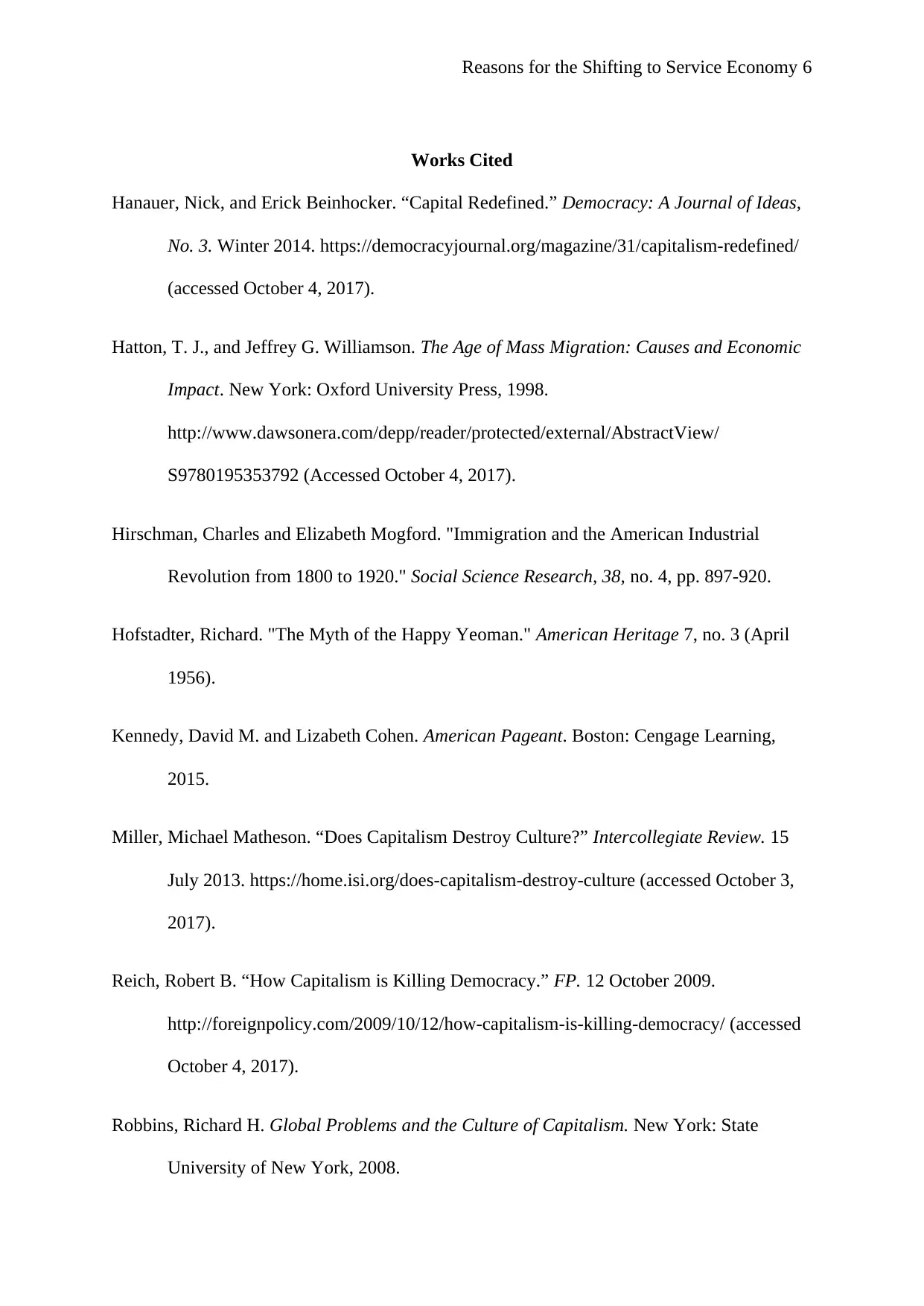
Reasons for the Shifting to Service Economy 6
Works Cited
Hanauer, Nick, and Erick Beinhocker. “Capital Redefined.” Democracy: A Journal of Ideas,
No. 3. Winter 2014. https://democracyjournal.org/magazine/31/capitalism-redefined/
(accessed October 4, 2017).
Hatton, T. J., and Jeffrey G. Williamson. The Age of Mass Migration: Causes and Economic
Impact. New York: Oxford University Press, 1998.
http://www.dawsonera.com/depp/reader/protected/external/AbstractView/
S9780195353792 (Accessed October 4, 2017).
Hirschman, Charles and Elizabeth Mogford. "Immigration and the American Industrial
Revolution from 1800 to 1920." Social Science Research, 38, no. 4, pp. 897-920.
Hofstadter, Richard. "The Myth of the Happy Yeoman." American Heritage 7, no. 3 (April
1956).
Kennedy, David M. and Lizabeth Cohen. American Pageant. Boston: Cengage Learning,
2015.
Miller, Michael Matheson. “Does Capitalism Destroy Culture?” Intercollegiate Review. 15
July 2013. https://home.isi.org/does-capitalism-destroy-culture (accessed October 3,
2017).
Reich, Robert B. “How Capitalism is Killing Democracy.” FP. 12 October 2009.
http://foreignpolicy.com/2009/10/12/how-capitalism-is-killing-democracy/ (accessed
October 4, 2017).
Robbins, Richard H. Global Problems and the Culture of Capitalism. New York: State
University of New York, 2008.
Works Cited
Hanauer, Nick, and Erick Beinhocker. “Capital Redefined.” Democracy: A Journal of Ideas,
No. 3. Winter 2014. https://democracyjournal.org/magazine/31/capitalism-redefined/
(accessed October 4, 2017).
Hatton, T. J., and Jeffrey G. Williamson. The Age of Mass Migration: Causes and Economic
Impact. New York: Oxford University Press, 1998.
http://www.dawsonera.com/depp/reader/protected/external/AbstractView/
S9780195353792 (Accessed October 4, 2017).
Hirschman, Charles and Elizabeth Mogford. "Immigration and the American Industrial
Revolution from 1800 to 1920." Social Science Research, 38, no. 4, pp. 897-920.
Hofstadter, Richard. "The Myth of the Happy Yeoman." American Heritage 7, no. 3 (April
1956).
Kennedy, David M. and Lizabeth Cohen. American Pageant. Boston: Cengage Learning,
2015.
Miller, Michael Matheson. “Does Capitalism Destroy Culture?” Intercollegiate Review. 15
July 2013. https://home.isi.org/does-capitalism-destroy-culture (accessed October 3,
2017).
Reich, Robert B. “How Capitalism is Killing Democracy.” FP. 12 October 2009.
http://foreignpolicy.com/2009/10/12/how-capitalism-is-killing-democracy/ (accessed
October 4, 2017).
Robbins, Richard H. Global Problems and the Culture of Capitalism. New York: State
University of New York, 2008.
⊘ This is a preview!⊘
Do you want full access?
Subscribe today to unlock all pages.

Trusted by 1+ million students worldwide
1 out of 6
Your All-in-One AI-Powered Toolkit for Academic Success.
+13062052269
info@desklib.com
Available 24*7 on WhatsApp / Email
![[object Object]](/_next/static/media/star-bottom.7253800d.svg)
Unlock your academic potential
Copyright © 2020–2026 A2Z Services. All Rights Reserved. Developed and managed by ZUCOL.